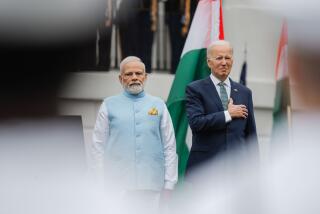Bush is facing reality on India
- Share via
The notion that President Bush blundered in promising to help India develop its nuclear energy program is understandable, widespread -- and wrong. With the Pentagon warning in a new assessment of the long-term threat posed by China’s military buildup, and a Chinese general huffing about lobbing nuclear weapons at the U.S. (although Beijing officially and predictably said he wasn’t speaking for the government), Bush’s move is long overdue.
This editorial page has fretted about rewarding India for subverting the nuclear nonproliferation treaty (New Delhi never signed) and worried that North Korea and Iran would seek further concessions after seeing India’s gains. But proliferation depends less on whether countries have signed the treaty than on whether they think it’s in their national interest to possess nuclear weapons (South Africa, for instance, voluntarily abdicated its nuclear arsenal). Meanwhile, it’s an open secret that the treaty is being subverted by Iran and battered by Brazil, which is refusing to allow the International Atomic Energy Agency unfettered access for inspections. The problem doesn’t rest in the treaty itself but elsewhere: If perks such as permanent U.N. Security Council membership weren’t implicitly tied to being a member of the recognized Big Five nuclear powers -- the U.S., Britain, China, Russia and France -- other countries might not suffer so much nuclear envy.
Unlike Pakistan, India has shown no interest in spreading nuclear technology around the globe. India has focused on its own military strength, alarmed by China’s military buildup in the Tibet Plateau and its attempt to develop a navy capable of dominating the Indian Ocean. The U.S. ability to deter China is eroding, not least because of the misbegotten Iraq war. Far from being reckless, Bush’s reaching out to India is a belated concession to the reality that the U.S. cannot go it alone. Selling India advanced fighter jets and dual-use nuclear technology will help solidify relations.
The agreement places India, a burgeoning democracy, on the same strategic footing as China. Why should there be a double standard for Asia’s two biggest countries, especially when one is reaching out to the U.S. and the other isn’t? Bush’s decision to return to balance-of-power politics should be greeted not with hand-wringing but with applause.
Jacob Heilbrunn
Editorial board members are granted one opportunity per year to use this space to voice their disagreement with an official position of the newspaper. As a general matter, although the board is responsible for every unsigned opinion, not every member agrees with every editorial.
More to Read
Sign up for Essential California
The most important California stories and recommendations in your inbox every morning.
You may occasionally receive promotional content from the Los Angeles Times.













